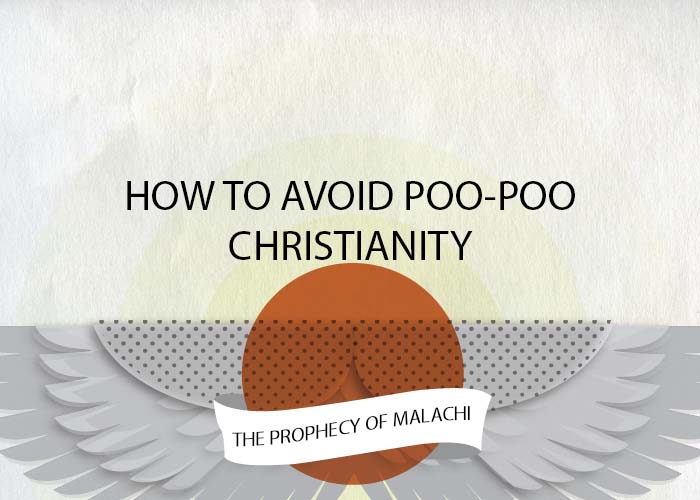HOW TO AVOID POO-POO CHRISTIANITY

Written by Doug Ponder on November 17, 2013
This article is a recap of the sermon How to Avoid Poo Poo Christianity in the God Is Coming series from the book of Malachi.
Worthy of Worship
The Scriptures, which contain the true story of the whole world, conclude with a majestic scene of all creation worshipping “him who is seated on the throne.” We fall down before him in worship saying, “Worthy are you, our Lord and God, to receive glory and honor and power, for you created all things, and by your will they existed and were created” (Rev. 4:9-11).
God not only created the world, he also continues to preserve it (Neh. 9:5) and uphold it by his powerful word (Heb. 1:3). He is righteous, holy, and just. He is for his creation, and therefore against evil. He is merciful and gracious, forgiving all who look to him. He is faithful to keep his promises, and history has proven his power to do so in spite of human rebellion.
In any and every way, because of who he is and what he has done, God is worthy of honor, respect, and reverence. That is why the Lord himself says, “My name will be great among the nations, from the rising to the setting of the sun” . . . “For I am a great king,” says the Lord almighty, and my name is to be revered among the nations” (Mal. 1:11, 14).
God Gets No Respect
But the trouble with humanity, as the Scriptures show us in various ways, is that no one has honored God has he deserves. To use the modern vernacular, “God gets no respect.”
“A son honors his father, and a servant his master. If I am a father, where is the honor due me? If I am a master, where is the reverence due me?” says the Lord of hosts. It is you, oh priests, who show contempt for my name. But you ask, ‘How have we shown contempt for your name?’” (Mal. 1:6).
God then answers their question, pointing out what they already knew. They had been half-heartedly worshipping God by disregarding his laws, sacrificing sickly and deformed animals, and complaining that worshipping God was a tremendous burden (Mal. 1:7-8, 10, 12-13).
Going through the Motions
They knew what they were doing was wrong, but it didn’t stop them from going through the motions. In fact, sometimes the people of Israel would make an even bigger show of their worship, hoping to please God with pomp and circumstance.
But God saw right through their outward showiness straight to their wicked hearts. He said, “What are the multitude of your sacrifices to me?” says the Lord. “I have had more than enough of burnt offerings, of rams and the fat of well-fed beasts; I do not delight in the blood of bulls or lambs or goats. When you come to appear before me, who has required of you this trampling of my courts? Stop bringing meaningless offerings! Your incense is detestable to me. New moons and Sabbaths and the calling of convocations—I cannot endure your evil assemblies. Your new moon festivals and your appointed feasts my soul hates. They have become a burden to me; I am weary of bearing them. When you spread out your hands in prayer, I will hide my eyes from you; even if you offer many prayers, I will not listen for your hands are full of blood” (Isa. 1:11-15).
Instead of seeking justice and correction oppression, they had made a mockery of God’s laws and did what was evil without remorse, all while believing that their showy acts of worship would somehow make them right in the eyes of God.
Knee-deep in Crap Christianity
The point of the passage is not to tell us, “Don’t be like Israel.” For in fact, we already are more like them than we realize. Our own lives are full of acts of injustice and sins of every kind. But then we raise our hands in worship, or toss some money in the plate, or say a quick prayer before each meal, thinking that these sorts of actions make God OK with us. They don’t.
That kind of thinking is actually a form of “crap Christianity” (or “poo poo Christianity,” if you can’t bring yourself to say “crap”). It’s a cheap, toxic, rotten form of the Christian faith that tries to pass itself off as being the real thing.
Examples include:
1. Thinking that Jesus basically came to convince some people of a few facts, and that believing these facts will get you a ticket to heaven. “Just believe in Jesus, then do whatever you like.”
2. Half-hearted commitment that gives lip service to God but has no real desire to obey him or serve others. This is seen especially in how people give—or more accurately, don’t give—their money to support God’s work in the world.
3. Treating the Christian faith as a source of endless entertainment. People who are guilty of this live their lives through Christian events, Christian concerts, Christian TV, Christian movies, Christian music, Christian T-shirts, etc.
4. Routines and ritualism, or thinking that merely going through the motions (like simply showing up for church services) somehow makes us right with God.
5. Hypocrisy, or showniness without genuineness. Hypocrites are especially judgmental of others and self-righteous.
6. Endless fact-absorbers, or people who think the Christian life is about Bible trivia games. These people love “hearing the word,” but they never do what it says.
7. Poopy pastors. Like the priests lead Israel into false worship instead of honoring God, many pastors are guilty of the same. Jesus said that these men are the worst offenders, for they are like wolves in sheep’s clothing (Matt. 7:15-16), having the appearance of godliness but denying its power (2 Tim. 3:5).
Jesus, Our Only Hope
None of us are innocent of all those charges. So what should we do? The worst response would be to double-down our efforts, thinking that by our obedience and our renewed commitment we could somehow make up for all the other evil and injustices in our lives.
Instead, what we need is a priest who can offer pure sacrifices for us. Malachi reminded his readers of a man named Levi. He was priest in the past who had pure of heart, unlike the priests of Malachi’s day. At the same time, Malachi knew that what we really needed was a priest who “has no need, like [other] high priests, to offer sacrifices daily, first for his own sins and then for those of the people.” Though he did not know his name, Malachi knew that God would send another priest who could perfectly keep the covenant of Levi.
Jesus was that priest. He was the “true and better Levi.” For while Levi revered the Lord, Jesus perfectly obeyed him. Levi stood in awe of God’s name, but Jesus bore the name of God. True instruction was found in Levi’s mouth, but Jesus was the very Word of God. Levi walked with God in peace and uprightness, but Jesus committed no sin. Levi turned many from iniquity, but Jesus saved many from their sins.
For when Jesus came into the world, he reminded everyone of what God had said: “Sacrifices and offerings you have not desired, but a body you have prepared for me; in burnt offerings and sin offerings you have taken no pleasure. Then I said, ‘Behold, I have come to do your will, O God, as it is written of me in the scroll of the book’” (Heb. 10:5-7). And the author of Hebrews adds, “By that will we have been sanctified [made holy] through the offering of the body of Jesus Christ, once for all. For every priest stands daily at his service, offering repeatedly the same sacrifices, which can never take away sins. But when Christ had offered for all time a single sacrifice for sins, he sat down at the right hand of God, waiting from that time until his enemies should be made a footstool for his feet. For by a single offering he has perfected for all time those who are being sanctified” (Heb. 10:11-14).
In other words, Jesus has already made us right with God. So whatever “sacrifices” we make on God’s behalf should never be aimed at doing what Jesus has already accomplished. Instead, through Jesus we seek simply to honor God as he deserves. For the Scriptures say, “As you come to him, a living stone rejected by men but chosen and precious in the sight of God, you yourselves like living stones are being built up as a spiritual house, to be a holy priesthood, to offer spiritual sacrifices to God through Jesus Christ” (1 Pet. 2:4-5).
Doug Ponder is one of the founding pastors of Remnant Church in Richmond, VA, where he serves in many of the church’s teaching ministries. He has contributed to several published works and is the author of Rethink Marriage & Family. His interests include the intersection of theology, ethics, and the Christian life. Follow him on Twitter @dougponder.






